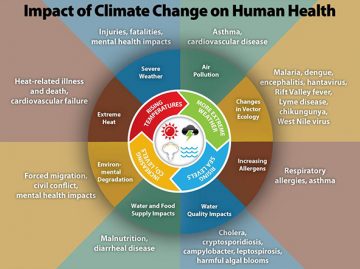
Source: CDC – National Centre for Environmental Health Team Leads:
Team Leaders: Sandra Smiley, Preet Gandhi, Anna de Waal, Maya Venkataraman, Crystal Gong
Website: ubcmedicalstudentsforclimateaction.com
Location: N/A
Duration: throughout the year
Positions: 8-10 students
Faculty supervisor: Dr. Videsh Kapoor (and other consultants)
This is an opportunity for students to explore and conduct research on the health and environmental impacts of climate change; to identify current guidelines and policy on climate change and health; to locate and/or develop new tools to foster awareness among healthcare providers and the community; and to better understand and/or join advocacy efforts relating to climate change and health at the local, provincial, national, or international levels.
Students can collaborate with EnviroMed, a UBC Medicine Club that fosters advocacy and education around the links between health, medicine, and the environment.
Students of the Climate and Environmental Health project may build upon the work of previous years’ students, and present their work in a variety of formats, including further modules on the student-led curricular website UBC Medical Students for Climate Action. Through their collaboration on the Climate and Environmental Health project, students can explore and influence the future of healthcare, a defining challenge of which will be climate change.
Applications:
Please download and complete the form, and email to ubc.ghi@gmail.com by October 23, 2023 (11:59pm).
Publications, presentations, and modules by students involved in Climate and Environmental Health
Modules:
UBC Medical Students for Climate Action – Keiko Patterson, Sarah Poteryko, Lise van Amerom, Montana Blum, 2022
Health Care and Climate Change – Valerie Lai, UBC MD 2020
Publications:
Managing eco-anxiety in primary health care: A review of the literature Citation: The Summit on Mental Health and Climate Change, presented 2 Feb 2023.
Climate change and Human Health Citation: UBCMJ. 2020: 11.2 (17-19)
- Advocacy Project: use our research to advocate for increasing climate change education within the medical curriculum
- Projects to Enhance Sustainability within Healthcare
- Develop resources to help clinicians make their practices more environmentally friendly
- Create guidelines and educational opportunities for physicians to learn more about the impacts of climate change on health, especially in vulnerable populations
- Create online educational modules
- GHI Workshops
- Host annual workshops for the GHI Workshop Program